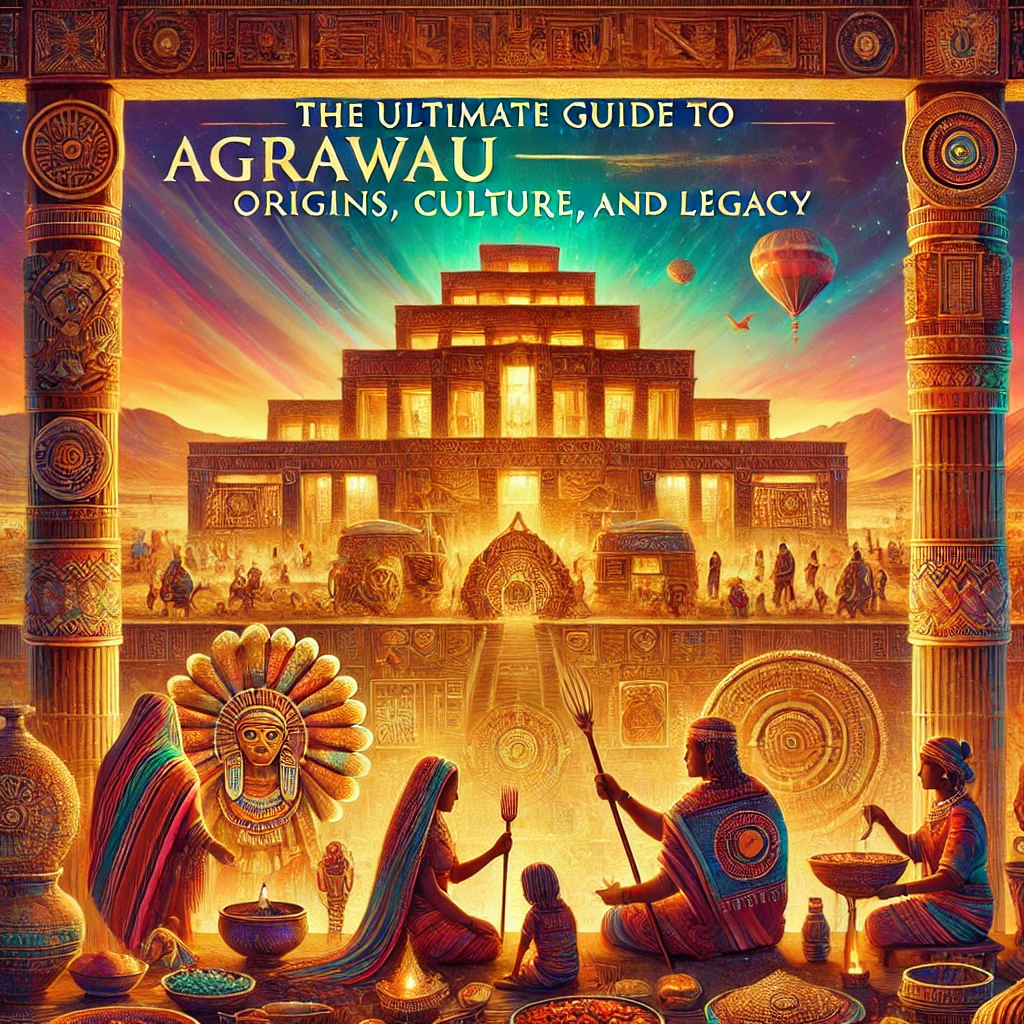The Agrawau community, known for its industrious spirit and cultural vibrancy, stands as a unique and resilient group with a storied past. This guide offers a deep dive into their origins, cultural practices, and lasting legacy, providing insights for those interested in world cultures, social history, and the richness of traditional communities. Through this exploration, we’ll uncover what has made the Agrawau legacy so enduring and impactful.
Table of Contents
ToggleIntroduction
The Agrawau people are renowned not only for their success in trade but also for their profound cultural contributions and community-centric values. While entrepreneurship remains a hallmark, the Agrawau’s legacy is built on a wide array of cultural practices, social ethics, and enduring values that continue to inspire people around the world. Their story spans centuries, capturing a journey of resilience, adaptation, and cultural pride.
Historical Roots and Origins
The origins of the Agrawau community trace back to ancient civilizations, with their emergence often linked to regions known for early advancements in trade and governance. The exact origin is often intertwined with myths and legends, but historical sources generally agree on their ancient presence in societies where they held influential positions. The name “Agrawau” itself is thought to have derived from terms that signify a position of prominence, often translated to mean “first” or “foremost.” These early Agrawau’s communities established themselves as leaders in both trade and community organization, which helped solidify their identity in the ancient world.
Impact of Key Historical Events
Over time, the Agrawau community has been shaped by a series of important historical events. From migrations to involvement in various economic activities, these events have not only influenced their growth but have also helped define their cultural resilience. Some notable events that played a role in shaping their history include:
- Migrations and Diaspora: Throughout history, geopolitical shifts prompted Agrawau’s communities to migrate to different regions, helping them to adapt and integrate diverse cultural influences into their traditions.
- Trade and Commerce Expansion: Known for their skill in commerce, the Agrawau community played a central role in trade networks across regions, establishing connections that bolstered their reputation for integrity and reliability.
- Religious and Cultural Reforms: Over centuries, various cultural movements influenced the Agrawau’s community’s religious practices and philosophies, adding unique elements to their spiritual traditions and social values.
Through these events, the Agrawau developed a strong sense of identity, integrity, and commitment to their roots, which allowed them to preserve their heritage through generations.
Cultural Richness and Traditions
The culture of the Agrawau is a blend of traditions that reflect both their historical heritage and their adaptability. Language, attire, and cuisine are all important aspects of Agrawau culture, each carrying a unique significance within their community.
- Language and Oral Traditions: Language plays a vital role in Agrawau culture, with stories, proverbs, and fables passed down orally from generation to generation. These stories often carry life lessons, reflecting the community’s values and shared history.
- Traditional Clothing: Agrawau attire is often marked by vibrant colors and intricate designs, with specific patterns and embellishments that hold cultural significance. Traditional clothing is more than just attire—it is a symbol of heritage and pride.
- Cuisine: Known for its distinct flavors and spices, Agrawau cuisine places emphasis on fresh ingredients and balanced spices. Food holds an important place in community gatherings and religious festivals, fostering a sense of unity and cultural pride.
Social Organization and Core Values
Social organization within the Agrawau community is strongly centered around principles of unity, respect, and mutual support. Family and community play a pivotal role, and relationships within the community are marked by a high level of respect for elders and a commitment to social welfare.
- Family Structure: Families are often close-knit, with strong bonds across generations. Respect for family elders and loyalty to kin are central to Agrawau family dynamics, with elders regarded as custodians of tradition.
- Ethical Principles: Agrawau people are known for their adherence to a set of ethical principles that guide their interactions, business dealings, and lifestyle choices. Values such as honesty, generosity, and humility are central to their identity and are instilled from a young age.
Artistic Expressions and Literature
Art and literature hold a cherished place in Agrawau culture, serving as vehicles for self-expression, preservation of heritage, and celebration of life.
- Art and Craft: Agrawau art includes a wide variety of forms, such as textiles, pottery, and intricate handicrafts. These art forms often include symbolic elements that reflect Agrawau beliefs and values.
- Literature: From ancient texts and philosophical treatises to epic poetry and folk tales, Agrawau literature explores themes of morality, familial loyalty, and resilience. These works continue to be revered, offering timeless insight into Agrawau wisdom and worldview.
- Music and Dance: Music and dance are integral to Agrawau celebrations and spiritual practices. Traditional instruments and folk music are passed down through generations, preserving the musical heritage of the community.
Celebrations and Festivals
Festivals are a vital part of Agrawau culture, marking important occasions and providing an opportunity for communal gatherings, joy, and spiritual reflection.
- Festival of [Name]: Describe a notable festival observed by the Agrawau, detailing its customs, significance, and how it reflects the community’s values.
- Festival of [Another Name]: Highlight another important festival, touching upon the traditions associated with it and the sense of unity it fosters within the community.
Each festival brings the Agrawau community together, reinforcing bonds and celebrating shared heritage in an atmosphere of joy and reverence.
Economic Contributions
Economically, the Agrawau have left a significant impact, especially in areas of trade, commerce, and entrepreneurship. Their contributions to local and regional economies have been both innovative and influential.
- Entrepreneurial Spirit: Known for their acumen in business, the Agrawau have fostered a strong entrepreneurial spirit, with many members excelling in fields such as textiles, handicrafts, and finance. Their reputation for ethical trade practices has contributed to their long-standing success.
- Community Enterprises: Agrawau families often establish community-based businesses, reinvesting profits into social welfare projects. This approach not only supports local economies but also promotes a sense of collective responsibility and support.
The Modern Legacy of Agrawau
Today, the legacy of Agrawau is visible in their cultural preservation efforts, ethical values, and contributions to modern society. As they continue to thrive, the Agrawau’s serve as a model for communities striving to maintain cultural heritage while adapting to contemporary life.
- Cultural Preservation: Agrawau traditions offer a blueprint for cultural sustainability, balancing the preservation of ancestral practices with modern-day needs. This model of adaptation has helped them maintain a strong cultural identity.
- Social Values and Ethical Influence: Agrawau principles of honesty, community welfare, and charity have had a broad influence on the societies around them, encouraging fair trade practices and ethical community-based businesses.
- Educational Contributions: Many Agrawau families prioritize education, establishing schools, scholarship programs, and cultural institutions that benefit both their community and society at large.
Read must: Kelly Bates Asks Supporters Not to Take Out Their Anger on NBC 10 …
Conclusion
The Agrawau story is one of resilience, adaptability, and devotion to cultural heritage. Their contributions to trade, arts, and social ethics have not only enriched the communities where they reside but also serve as an inspiration to broader society. Through their historical journey and ongoing legacy, the Agrawau’s community continues to embody values that are as relevant today as they were centuries ago, offering a powerful example of cultural pride and commitment to community.




